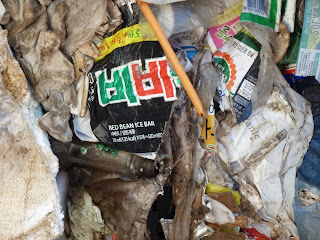Toxics Watchdog Urges DTI to Enforce Mercury Warning Label for Fluorescent Lamps (CFLs Fail to Provide Mercury Warning Information)
An environmental watchdog
promoting chemical safety and zero waste today urged the government to
implement without further delay the warning label for energy-efficient but
mercury-containing fluorescent lamps.
The EcoWaste Coalition requested the Department of Trade and Industry – Bureau
of Product Standards (DTI-BPS) to put in force the amended Philippine National
Standard (PNS) on “Self-Ballasted Lamps for General Lighting Services - Safety
Requirements” adopted in December 2013.
PNS IEC 60968:2012, amended following an appeal by environmental groups,
states that “lamps shall additionally be accompanied (with) the following
warning...legibly marked on the packaging: WARNING: Contains Mercury,
Handle with Care and Dispose Properly.”
“Compact fluorescent lamps (CFLs) being sold in the
market still lack the essential mercury warning label,” lamented Thony
Dizon, Coordinator of the EcoWaste Coalition’s Project Protect.
“A warning label will tell consumers that the lamp has mercury, that such a
lamp should be handled with extreme caution and that a busted or spent lamp
should not be thrown in ordinary trash as it is currently done,” he explained.
In test buys conducted by the group on April 24-26,
2015, all 10 samples of CFLs bought from formal retailers (Ever
Supermarket, Paco, Manila; Puregold, Kalayaan Ave., Quezon City; and Shopwise,
Vito Cruz Extension, Makati City) and informal retailers (sidewalk vendors in
Paco and Quiapo, Manila) were found to contain no mercury warning information.
Among the CFLs with no mercury warning labels include: CATA, Delta, DHX, DK,
Firefly, May, Panasonic, Philips, Sylvania and Xin Mey.
“We request the DTI-BPS to fast track the process that will make it mandatory
for all fluorescent lamps to contain such a precautionary warning,” Dizon said.
“This basic labeling requirement in compliance with the Consumer Act of the
Philippines should not find any resistance from responsible members of the
lighting industry who also have the safety of their customers in mind,” he
stated.
The EcoWaste Coalition said that the DTI-BPS should also require fluorescent
lamps to clearly and durably indicate their mercury content to allow consumers
to have the option of selecting those with lower mercury.
Indicating their mercury content will also
facilitate proper identification and inventory of CFLs and other
mercury-added lamps to be phased out by 2020 under the Minamata Convention on
Mercury.
Signed by the Philippine Government in 2013 through DENR Secretary Ramon J.P.
Paje, the said Convention, among other things, directs the phase out by 2020 of
CFLs equal to or less than 30 watts with more than 5 mg of mercury per bulb.
According to the World Health Organization,
“exposure to mercury – even in small amounts – may cause serious health
problems, and is a threat the development of the child in utero and
early in life,” adding that “mercury may have toxic effects on the nervous,
digestive and immune systems, and on lungs, kidneys, skin and eyes.”
In July 2013, the EcoWaste Coalition and 16 other organizations, wrote to the
Secretaries of the Department of Energy (DoE), Department of Environment and
Natural Resources (DENR) and the Department of Trade and Industry (DTI)
demanding that lamp manufacturers, importers and distributors adhere to
“contains mercury” disclosure on product labels in line with the consumers’
basic “right to know.
In 2011, the EcoWaste Coalition prepared a study on
CFLs that got included in the “Study on the Possible Effects
on Human Health and the Environment in Asia and the Pacific of the Trade of
Products Containing Lead, Cadmium and Mercury” published by the United Nations
Environment Programme.
-end-
Reference:
http://www.who.int/mediacentre/factsheets/fs361/en/





Comments